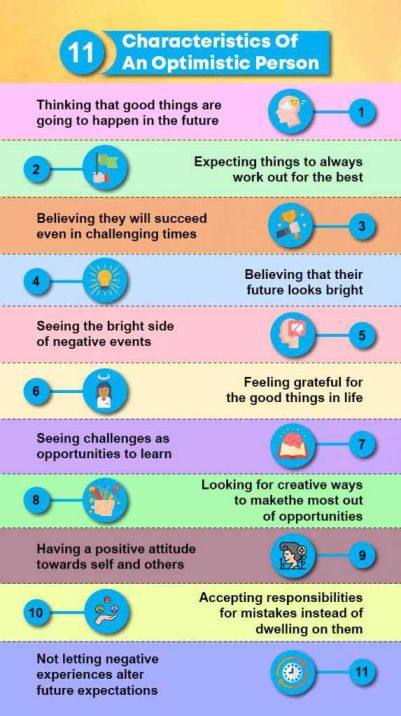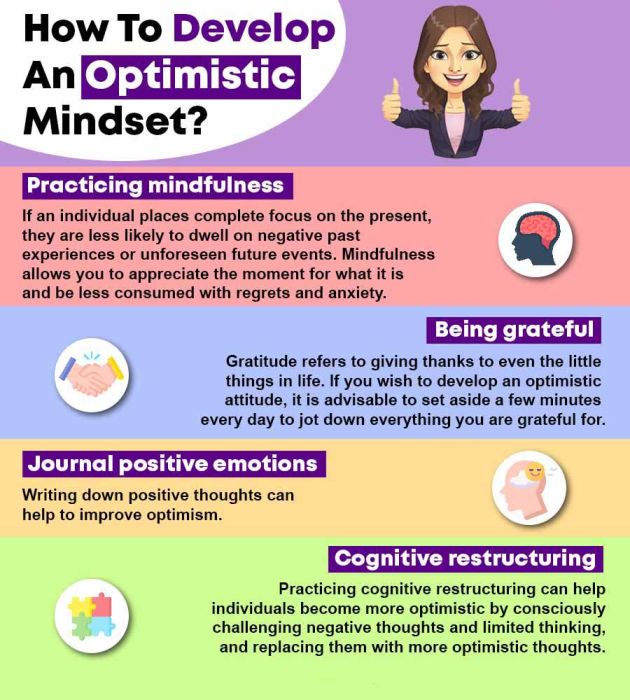Optimism can be defined as a positive mental outlook characterized by hope and confidence in a positive and favorable future.
What Is Optimism?
Optimism is an attitude that is characterized by embracing positivity and the tendency to believe in a better and favorable future. The experts at Mind Help explain that it refers to our “innate hopefulness. It is the positive attitude that makes us believe good things will happen to us and our goals will be accomplished eventually.” Optimistic individuals tend to predict desirable outcomes either through chance or effort and perseverance. The term derives from the Latin word “optimum” meaning “best”.
A 2010 study 1 Conversano, C., Rotondo, A., Lensi, E., Della Vista, O., Arpone, F., & Reda, M. A. (2010). Optimism and its impact on mental and physical well-being. Clinical practice and epidemiology in mental health : CP & EMH, 6, 25–29. https://doi.org/10.2174/1745017901006010025 explains that the concept “embraces two closely correlated concepts: the first is the inclination to hope, while the second more generally refers to the tendency to believe that we live in ‘the best of all possible worlds’.” The heritability of optimism is estimated to be approximately 25%. A 1993 twin study 2 Schulman P, Keith D, Seligman ME. Is optimism heritable? A study of twins. Behav Res Ther. 1993 Jul;31(6):569-74. doi: 10.1016/0005-7967(93)90108-7. PMID: 8347115. suggested that there may be a substantial genetic effect on optimism.
Understanding Optimism
Optimism in psychology is referred to as dispositional optimism. Optimists are people who expect good outcomes even in stressful situations. On the other hand, pessimistic people tend to expect unfavorable outcomes. People who are optimistic believe that positive events are more stable and frequent than negative ones. They believe that they can avoid problems in daily life and prevent them from happening. This allows them to cope with stressful situations better than pessimists. Optimists are often found to be more resilient when facing stressful situations.
Optimists tend to consider hardships as learning opportunities. Even in unfavorable situations, they believe that tomorrow will be better. Evidence suggests that optimistic people present a higher quality of life compared to those with low levels of optimism. A 2010 study suggests that people with this mindset are often linked with numerous benefits such as good coping skills, better health, lower stress levels, and more achievements. A 1995 study 3 Peterson C, De Avila ME. Optimistic explanatory style and the perception of health problems. J Clin Psychol. 1995 Jan;51(1):128-32. doi: 10.1002/1097-4679(199501)51:1<128::aid-jclp2270510120>3.0.co;2-1. PMID: 7782467. found that optimistic people were more able to prevent health problems than pessimistic people. Hence being an optimist can go a long way in achieving success and having a positive outlook towards life.
A 2007 study 4 Giltay EJ, Geleijnse JM, Zitman FG, Buijsse B, Kromhout D. Lifestyle and dietary correlates of dispositional optimism in men: The Zutphen Elderly Study. J Psychosom Res. 2007 Nov;63(5):483-90. doi: 10.1016/j.jpsychores.2007.07.014. PMID: 17980220. demonstrated that in the presence of severe pathological conditions, optimistic people tend to adapt better in such extreme circumstances. It is essential to keep in mind that positive and negative expectations regarding the future are important for understanding the vulnerability to mental disorders, in particular to mood disorders. A 2001 study 5 Chang EC, Sanna LJ. Optimism, pessimism, and positive and negative affectivity in middle-aged adults: a test of a cognitive-affective model of psychological adjustment. Psychol Aging. 2001 Sep;16(3):524-31. doi: 10.1037//0882-7974.16.3.524. PMID: 11554528. found an inverse correlation between optimism and depressive symptoms, as well as suicidal instincts 6 Hirsch JK, Conner KR, Duberstein PR. Optimism and suicide ideation among young adult college students. Arch Suicide Res. 2007;11(2):177-85. doi: 10.1080/13811110701249988. PMID: 17453695. .
Signs Of Optimism

The key characteristics of an optimistic person are as follows:
- Thinking that good things are going to happen in the future
- Expecting things to always work out for the best
- Believing they will succeed even in challenging times
- Believing that their future looks bright
- Seeing the bright side of negative events
- Feeling grateful for the good things in life
- Seeing challenges as opportunities to learn
- Looking for creative ways to make the most out of opportunities
- Having a positive attitude towards self and others
- Accepting responsibilities for mistakes instead of dwelling on them
- Not letting negative experiences alter future expectations
Factors Influencing Optimism
There may be several factors that influence optimism. However, in order to determine whether a person is an optimist or pessimist depends on how they explain the events of their life.
1. Explanatory Styles
It is also known as the attribution style. This refers to how people explain the different events of their life. There are usually three ways on how people can explain their life events. These can influence whether the individual is an optimist or a pessimist. However, realists tend to see things clearly. But most people are not realists. They tend to attribute their life events either optimistically and pessimistically.
A. Stable Vs. Unstable
Stable refers to when the individual believes that with time things will change for the better. On the other hand, unstable refers to when the individual thinks that things will not change despite the passage of time. Hence distinction can be made between optimists and pessimists on the grounds of whether it is possible for time to change things or does it remain constant regardless of time?
B. Global Vs. Local
A clear distinction can be made when an individual views a negative or positive life event as a section of their life or if they define life as a whole on the basis of it. Global refers to viewing the life event as a natural part of their life. Local refers to viewing the life event as the defining aspect of their life. Global vs Local represents whether the life event is representing a section of their life or life as a whole?
C. Internal Vs. External
The difference in beliefs can be found between optimists and pessimists when they attribute life events to an internal or external force. Internal vs external represents the distinction between whether it feels like the life event was caused by an internal or an external force?
2. Optimistic Explanatory Style
Optimists describe positive events as an occurrence of their own actions (internal) or characteristics. They also tend to see them as evidence of more positive things that will happen in the future (stable). It also involves other areas of life as well (Global). On the contrary, people who believe in optimism see negative events as not their fault (external). They also believe that these events occurred by chance and have nothing to do with other areas of their lives or future events.
For instance, if an optimistic person gets a promotion, they are more likely to believe that it occurred because they are good at their job and will receive more benefits and promotions in the future. If the promotion was passed over to someone else, it’s likely because they are having a bad month because of unexplainable circumstances, but will do better in the future.
3. Pessimistic Explanatory Style
Pessimists believe that negative events occur due to their own mistakes or traits (internal). They believe that one mistake will lead to more mistakes (stable) and it will also occur in other areas of life (global). Pessimistic people also believe that positive events occur by chance and they have no control over it (external) and it probably won’t reoccur (unstable).
For instance, in case a pessimist gets a promotion, they will see it as a lucky event that won’t reoccur. They also may worry that they will be under more vigilance. If it was passed over to a different person they will think that they weren’t skilled enough to get it. Hence, they would expect it to be passed over again.
How To Develop An Optimistic Mindset

Practicing optimism works in the favor of the individual because they recover quickly from negative events. Positive events tend to affirm their belief in themselves and ensure the continuance of good things in their life. Hence, if you are a pessimistic person you can actively participate in practicing optimism. It is possible to develop learned optimism 7 Reivich, K., & Gillham, J. (2003). Learned optimism: The measurement of explanatory style. Positive psychological assessment: A handbook of models and measures, 57-74. https://doi.org/10.1037/10612-004 . Pessimists can attempt to be optimists by analyzing their thinking towards adversity and consciously challenge negative self-talk. Some of the practices that can be inculcated in life to become an optimist are as follows:
1. Practicing mindfulness
Mindfulness involves being aware of the present moment and focusing all energy on the now. This technique helps to cancel out all the worries of the future and regrets of the past by being present in whatever is happening at this moment. A 2017 study 8Kiken, L. G., Lundberg, K. B., & Fredrickson, B. L. (2017). Being present and enjoying it: Dispositional mindfulness and savoring the moment are distinct, interactive predictors of positive emotions and psychological health. Mindfulness, 8(5), 1280–1290. https://doi.org/10.1007/s12671-017-0704-3 pointed out that if an individual places complete focus on the present, they are less likely to dwell on negative past experiences or unforeseen future events. Mindfulness allows you to appreciate the moment for what it is and be less consumed with regrets and anxiety.
2. Being grateful
Gratitude refers to giving thanks to even the little things in life. It is a way of showing appreciation for all the good things in life. A 2018 scientific study found that participants who were asked to write and maintain a gratitude journal showed signs of increased optimism and resilience. If you wish to develop an optimistic attitude, it is advisable to set aside a few minutes every day to jot down everything you are grateful for.
3. Journal positive emotions
Writing down positive thoughts can help to improve optimism. A 2018 study that expressive writing focused on positive emotions were directly linked to decreased mental distress and improved mental health.
4. Cognitive restructuring
Practicing cognitive restructuring can help individuals become more optimistic by consciously challenging negative thoughts and limited thinking, and replacing them with more optimistic thoughts. The steps involved in cognitive restructuring are as follows:
- Identify the situations or events that are triggering negative thoughts or moods
- Assess how you feel at this moment
- Identify the negative thoughts occurring in response to the event
- Look for evidence that supports or disproves your negative thoughts
- Look at objective facts and replace negative thoughts with positive ones
Read More About Cognitive Biases Here
Influence of Optimism
A 2006 research study 9 Nes LS, Segerstrom SC. Dispositional optimism and coping: a meta-analytic review. Pers Soc Psychol Rev. 2006;10(3):235-51. doi: 10.1207/s15327957pspr1003_3. PMID: 16859439. has shown that practicing optimism and being an optimist can be advantageous. Some of the positive influence of optimism can include:
1. Improved health
Research 10 Conversano C, Rotondo A, Lensi E, Della Vista O, Arpone F, Reda MA. Optimism and its impact on mental and physical well-being. Clin Pract Epidemiol Ment Health. 2010 May 14;6:25-9. doi: 10.2174/1745017901006010025. PMID: 20592964; PMCID: PMC2894461. shows that optimists are more likely to maintain better physical health than pessimists. This includes a 50% lower risk of cardiovascular disease and greater survival rates 11 Carver CS, Pozo C, Harris SD, Noriega V, Scheier MF, Robinson DS, Ketcham AS, Moffat FL Jr, Clark KC. How coping mediates the effect of optimism on distress: a study of women with early stage breast cancer. J Pers Soc Psychol. 1993 Aug;65(2):375-90. doi: 10.1037//0022-3514.65.2.375. PMID: 8366426. when fighting cancer. Some studies also found higher rates of infectious disease, poor health, and earlier mortality in pessimists. Studies 12 Segerstrom S. C. (2005). Optimism and immunity: do positive thoughts always lead to positive effects?. Brain, behavior, and immunity, 19(3), 195–200. https://doi.org/10.1016/j.bbi.2004.08.003 have also found that optimism is also associated with immunity as well.
2. Achievements
The father of positive psychology, Martin Seligman, studied sports teams and found that optimistic teams created more positive synergy and performed better than pessimistic teams. Another 2012 study 13 Stanula, A., Maszczyk, A., Roczniok, R., Pietraszewski, P., Ostrowski, A., Zając, A., & Strzała, M. (2012). The development and prediction of athletic performance in freestyle swimming. Journal of Human Kinetics, 32(1), 97-107. https://doi.org/10.2478/v10078-012-0027-3 showed that pessimistic swimmers, who were led to believe they had done worse than they had, were more likely to believe they were prone to poor future performance. On the other hand, optimistic swimmers were not vulnerable to it.
3. Endurance
Optimists don’t give up easily and that is probably why they succeed. People who are optimistic are more likely to continue working towards their goals despite having obstacles, challenges, and setbacks. Such endurance ultimately leads them to accomplish their goals.
4. Emotional Health
A 2010 study 14 Driessen, E., & Hollon, S. D. (2010). Cognitive behavioral therapy for mood disorders: Efficacy, moderators and mediators. Psychiatric Clinics of North America, 33(3), 537-555. https://doi.org/10.1016/j.psc.2010.04.005 suggests cognitive therapy can be as effective or more effective than antidepressants in the treatment of clinical depression. Such improvements tend to be long lasting. People who have this training in optimism tend to become better able to effectively handle future challenges. One 2015 study 15 Kleiman, E. M., Chiara, A. M., Liu, R. T., Jager-Hyman, S. G., Choi, J. Y., & Alloy, L. B. (2017). Optimism and well-being: a prospective multi-method and multi-dimensional examination of optimism as a resilience factor following the occurrence of stressful life events. Cognition & emotion, 31(2), 269–283. https://doi.org/10.1080/02699931.2015.1108284 found that certain dimensions of optimism such as Positive Expectations (PE) and Sense of Invulnerability (SI) can help to cope with depression and anxiety.
5. Increased Longevity
Optimists live significantly longer than pessimistic people. One 2008 study 16 Saint Onge, J. M., Rogers, R. G., & Krueger, P. M. (2008). Major League Baseball Players’ Life Expectancies. Social science quarterly, 89(3), 817–830. https://doi.org/10.1111/j.1540-6237.2008.00562.x found that 34 healthy Hall of Fame baseball players who played between 1900 and 1950 lived longer due to their optimistic nature. A 2013 study 17 Applebaum, A. J., Stein, E. M., Lord-Bessen, J., Pessin, H., Rosenfeld, B., & Breitbart, W. (2013). Optimism, social support, and mental health outcomes in patients with advanced cancer. Psycho-Oncology, 23(3), 299-306. https://doi.org/10.1002/pon.3418 showed that optimistic breast cancer patients had a better quality of life than pessimistic and hopeless patients.
6. Decreased stress
People who practice optimism tend to experience less stress than pessimists or realists. They believe in themselves and their abilities and expect good outcomes. Optimists view negative events as minor setbacks that can be easily overcome and tend to view positive events as evidence of more good events in the future. They also take more risks because they believe in themselves and hence create more positive events in their lives.
A 2008 research study 18 Lopes, M. P., & Cunha, M. P. (2008). Who is more proactive, the optimist or the pessimist? Exploring the role of hope as a moderator. The Journal of Positive Psychology, 3(2), 100-109. https://doi.org/10.1080/17439760701760575 also suggests that optimists are more proactive while managing stress. They prefer approaches that reduce or eliminate stress. Since optimistic people work harder at stress management, they are less likely to be stressed.
Consequences Of Optimism
Even though optimism can be advantageous, it doesn’t necessarily mean that there cannot be consequences of being too optimistic. Some of the potential pitfalls of optimism include:
1. Optimism bias
In the case of optimism bias, excessive optimism can lead an individual to only focus on the positive things and avoid all the negative things. Optimism bias makes people underestimate the risk of experiencing negative events. Hence, this can lead to engaging in risky behaviors that increase the chances of experiencing a bad outcome.
2. Toxic positivity
In some cases, people tend to overestimate positive feelings while ignoring negative feelings. It may also enable people to nullify the emotional experiences that they may go through during difficult times. One 1986 study 19 Scheier MF, Weintraub JK, Carver CS. Coping with stress: divergent strategies of optimists and pessimists. J Pers Soc Psychol. 1986 Dec;51(6):1257-64. doi: 10.1037//0022-3514.51.6.1257. PMID: 3806361. confirmed optimists tend to use coping strategies that focus on the problem more frequently compared to pessimists. When these strategies cannot be used, they resort to adaptive strategies that are most focused on the emotions, for instance, acceptance, humor, and positive re-assessment of the situation.
3. Faulty risk assessment
When people are over-optimistic, they are less likely to think about the potential risks and take steps to resolve these issues. Hence, they are more likely to run into major problems along the way.
Approach To Optimism
Focusing on a healthy realistic approach to optimism can go a long way to avoid the consequences of being too optimistic. It is essential to embrace the events that are currently occurring instead of focusing on staying positive while ignoring all other emotions. The primary goal is to look at the positive aspect despite the obstacles that may come along the way.















